#they change depending on internal or external circumstances.
Text
🏳️⚧️🏳️🌈PRIDE THEMED OC ASK GAME🏳️🌈 🏳️⚧️
Bc I wanted one and didn't find it so. Here
[Send ask aimed at a specific character]
1. What's your oc's gender identity? What's their relationship to their gender?
2. What's your oc's orientation? (Romantic/sexual/platonic alterous ect) Do they have opinions about it?
3. How did your oc discover themself? Did something cause them to question, or did they always know?
4. Is your oc's environment supportive about their identity? How does this impact them?
5. How did you figure out your oc's identity?
6. How does your oc feel about labels? Theirs, or in general?
7. Is there something that could cause your oc to question their identity? What?
8. Have they had struggles with their identity, be it due to internal or external reasons?
9. Are there cultural or lore specific aspects to their identity? If applicable, does their species affect it?
10. Does your oc celebrate Pride? How?
11. Is your oc open about their identity? Are they more lowkey or more blunt about it? Why or why not?
12. Does/did your oc ever wish they could change the way they are? Why? If it's in the past, how did they get over the feeling? (this can be about internalized homo/transphobia)
13. Would your oc be open to a poly relationship? Why or why not?
[Not aimed at a specific character] / [Aimed at creator]
14. Do you have ocs on the aro or ace spectrum?
15. Do any of your ocs use neopronouns? Which ones?
16. Did you ever change an oc's identity when they were already established? Why?
17. Do you share identity with any of your ocs? Which ones?
18. Do you prefer to give your ocs specific labels, or keep it unspecified? Why? If applicable, do you change their labels depending on circumstance?
19. Do you have preferences about depicting homo/transphobia in your stories? What, and why? Does it vary by story?
20. Have your ocs helped you in self discovery? How?
21. Free ramble card wee
#Oc pride#Pride 2023#Pride month#Oc Pride ask#Oc asks#Oc questions#Oc ask game#Ask game#oc prompt#Pride ask game#Pride ask#Gay#Lesbian#Xenogender#Bisexual#Aromantic#Asexual#Trans
2K notes
·
View notes
Text
Why Jupiter is Unhappy in Venusian Signs

I already touched on this subject before but here’s another tip why Jupiter is unhappy in Venusian signs. Of course you can argue that it’s equally struggling in Mercurial signs. I’m not saying it’s not, just focusing on Venus more in this particular post.
Venus is the representation of the natural law. External cycles and ebbs and flows of nature, changing weather. That’s why it’s friends with Saturn, the lord of karma that governs regulation of these natural laws. So if your Jupiter is conjunct Venus or in Taurus or Libra, you’re the kind of person whose motivation is very sensitive energetically and your motivation and energy levels come and go like the weather.
The problem with such a perspective is that Jupiter rules an internal supply of faith that rules positive manifestation. Jupiter gives abundance from the inside spilling out. Venus is the reverse, creating feelings of internal peace by exposing oneself to the right external stimuli. Thus, Jupiter’s joy is unconditional but Venus is very conditional on external stimuli.
As a result, people with a Venusian Jupiter have a very conditional approach towards happiness. When something goes wrong externally, they fall into a slump internally. They can resort to addictions or coping mechanisms to weather through the storm and have a hard time putting themselves back together…and then when it passes and the cycle of nature changes, they will ride it again for more supply of optimism.
The issue with that is these kind of natives put themselves out of control of their lives. Spiritually, it may simply be their karma that they are dependent on cycles of nature when it comes to their luck. That can create cycles of luck and misery, interchangeably. Meanwhile, a native with a strong Jupiter can effortlessly manifest what they want at most times, regardless of external circumstances.
The other thing that contributes to the helplessness of these natives is that their luck can simply depend on others. Jupiter in Taurus can struggle to manifest anhthing in their lives without basic family support. Jupiter in Libra needs partnerships to manifest luck in cooperation with the other.
The antidote for such a Jupiter is not relying on it excessively. Jupiter only takes you so far, as it is less grounded than Saturn. A Venusian Jupiter finds happiness when Saturn gives it enough absolutes over time, so that whatever extra Jupiter brings is a cherry on top.
Another thing that helps with such a Jupiter is spirituality, especially if it’s placed in Moksha Houses. The realization here is that we are never truly alone and there is always someone working for our favor in the spiritual realm and physical relationships is not all that we have to rely on. So instead of relying excessively on human relationships if they become corrosive or unstable, you can build a trusting connection with the Universe or your Spirit Guides.
58 notes
·
View notes
Note
Hey, hope you’re having a good day! I love you and your writing and advice, so I wanted to ask if you had any tips for writing a couple falling out of love? I’m having trouble figuring out pacing of these feelings snd events and also if there needs to be more plot because maybe that’s not enough by itself? I’m trying to make the overall feeling very melancholy and hopeless. Anyway thank you!!
Whether there needs to be more plot depends on the specific story you want to tell. Is the couple breaking up part of a story or what the story is about? What theme do you want to convey? You want the ending of the relationship to feel melancholy and hopeless, but is that what you want the overall mood of the story to be as well?
I would say that it can't all be internal narration/monologue. Even if they just exemplify the slow decline of the relationship, concrete plot events and choices need to happen outside of the character's heads. You also need reasons (AKA plot events, whether they are in the story or the past) for the characters to change.
On writing a couple falling out of love, I have questions for you instead of outright tips. This is because my biggest tip is that you need to know your characters and understand the relationship to understand why it's breaking because it's a character driven thing. The reasons for the breaking dictate the pace.
So, consider:
Why did they fall in love in the first place?
What is it that they loved about each other? Once you know this, it is easier to come up with concrete examples that show both this love and also the love fading.
E.g. Character A loves that Character B is very expressive about their feelings. They might be quick to say compliments, or give gifts. The flip side, then, when they fall out of love, is either that Character B has stopped doing that for X reason or that this positive quality also becomes a flaw to Character A because Character B is equally expressive about sharing more critical feelings and it doesn't go down well.
What kind of love is it?
Have they been together a long time? Was it a passionate, short fiery thing? With that in mind, do you WANT the ending of the relationship to be quick or slow?
And why are they falling out of love NOW?
Is it that the feelings themselves have changed? E.g. one character used to love that the other one character took risks, but as they grew older they no longer find it charming? Because Character A no longer wants adventure, they want to settle down. Character goals and wants have changed. Hence, causing conflict in the relationship.
Is it that the circumstances have changed? E.g. Did some big life event happen that changed the relationship? Loss of a job, change in location, illness etc. Hence, causing conflict in the relationship.
Again, what physical and external things can represent the interior shifts in the relationship?
For example, if it is lack of attraction in the relationship, is there another character that one side of the couple has real chemistry with that highlights the loss of chemistry in their existing relationship? In which case, your B plot may be 'will they or will they not have an affair as they grow closer to this other character?'
If it is that one character not putting time/energy into the relationship any more...where is that time/energy going instead and why? What is the new goal? Do you want the reader to root for them to achieve it?
55 notes
·
View notes
Text
˚₊· ͟͟͞͞➳❥ 𝐩𝐞𝐫𝐬𝐢𝐬𝐭𝐞𝐧𝐜𝐞 𝐚𝐧𝐝 𝐛𝐫𝐚𝐳𝐞𝐧 𝐢𝐦𝐩𝐮𝐝𝐞𝐧𝐜𝐞
it's time for you to decide not to take no for an answer!
⋘ 𝑙𝑜𝑎𝑑𝑖𝑛𝑔 𝑑𝑎𝑡𝑎… ⋙
For more information, read brazen impudence by Neville Goddard
One of the most important aspects of manifestation is the ability and conviction to persist. There will be times in which you feel like nothing is happening, or even that something opposite to what you desire happens. It is easy to give up and start doubting when this happens. it is easy to say that you're not doing enough, or maybe even that the law of assumption isn't real.
First, we need to take a step back.
Let's talk about movement.
Movement is a complicated topic. Many people practicing the loa tend to focus on and depend on this idea of movement when manifesting. By doing this, you are allowing the 3D to be your confirmation. However, remember that the 3D holds absolutely no power over you. It is a mirror, not an all-powerful thing that can control you. This means that you are clinging to the idea that seeing is believing.
That's not how the loa works.
The law of assumption is the UNIVERSAL LAW that your assumptions create the world around you. Imagination creates. Everything stems from self. What you cultivate internally will be reflected externally. This means you need to first believe in order to see. And seeing isn't the important part. The experience you have in your 4D is more real than the physical experience that follows.
If you want something in your 3D, experience it in your 4D with complete faith that it is truly happening at that moment.
ALL THINGS ARE POSSIBLE IN IMAGINATION, THEREFORE ALL THINGS ARE POSSIBLE IN THE PHYSICAL WORLD.
Movement is silent. Movement is invisible. Movement can happen in half a second. Movement is always happening because everything that is, has been, and will ever be is already done.
There is nothing new to create because creation is done.
All of time is happening at once, but our human brains are only conscious of the present, however, we access all possible realities. By bringing anything to the imagination, you are accessing a true reality.
You must persist despite seeing no change.
Now, undesirable circumstances manifesting does NOT mean you're doing something wrong. There could be many reasons why they come up. However, the most important thing to do in these situations is to stand firm in your belief.
You must be stubborn. You must never take no for an answer when it comes to your desires. All things are possible. All things you desire are meant to be experienced by you. Therefore, you must not give up on your desires.
The only way to fail a manifestation is to give up. You cannot fail if you are persistent.
Persistence is what you do once you have decided that you firmly believe in the truth of your desire. You remain loyal to it. You believe in your internal imaginative experiences. You know that since you already experienced it in your imagination, it has NO CHOICE but to be reflected onto your physical external reality.
Persistence vs Brazen Impudence
Persistence is passive. You are persistent when it seems like nothing in your 3D has changed yet, but you are still remaining in the state of the wish fulfilled.
Brazen impudence, on the other hand, is active. You are brazenly impudent when you firmly look at your circumstances and face your 3D reality, even if it seems as though everything is falling apart, and you still stand firm in your beliefs.
You know that despite what's being shown to you, you must get your desires. There is no failure in your reality.
I don't care if the opposite is happening, I don't care if your "time crunch" manifestation is closing in and it looks like there is no hope. PERSIST. Be stubborn. Do not allow your 3D to have any power over you. You are the operant power, you control your reality, and you decide what shows up for you, not the 3D.
Circumstances, no matter how impossible it seems, NEVER matter.
Persist.
720 notes
·
View notes
Text
Witchcraft 101: An Introductory Post

What is Witchcraft?
Witchcraft is the practice of magick. It's a series of techniques one uses to harness and/or manipulate energies externally or internally to change one's surroundings of circumstances as well as themselves. This can be done through using herbs, stones, crystals, and other materials.
Witchcraft can, and is, performed in a plethora of ways. It can be done through meditation, spell work, rituals or even baking and cooking. Witchcraft is as unique as you are. To practice witchcraft you do not need a religion, however most people practice witchcraft to feel more connected to their chosen religion. Witchcraft is as unique as the individual demonstrating it.
What makes someone a witch?
A witch is a person who practices magick. Witches can come from any background, any age, race or gender and religion. The term 'witch' is a gender-neutral, universal name. A being who claims the title may do what they desire with the craft. There are many types of witches, all of which are nature based. Not all witches are interested in the same type practise, however. One may prefer the study and use of crystals, and another being drawn to divination or even one of the elements.
A witch is neither good or bad, as they are only human.
There aren't any rules to being a witch (unless your religion states otherwise). Whilst you don't have to be religious to be a witch, most witches who practise, are most commonly Wiccan.

What is Paganism?
Pagan is an umbrella term for the many non-Abrahamic religions. This included Hinduism, Wicca, Buddhism, Sikhism, etc. However, not a lot of people fall into a specific type of religion that comes under paganism but still believe in & worship more than one God/Goddess or Greater being such as the elements, for example. Many, if not most, witches, fall under the Wiccan religion.
Paganism, across all sub-genres, follow holidays/festivals, and in many religions, many they follow The Eight Sabbats, or Wheel of the Year. The Sabbats, depending on the religion, have slight variations in terms of rituals, timing and practicing of the holidays i.e. which God/Goddess is associated, traditional colours or foods. It also is up to the individual as to what they do and don't want to celebrate.
"All Wiccans are witches, but not all witches are wiccan. All Wiccans are Pagan, but not all Pagans are Witches."
Religion VS. Spirituality
Religion and spirituality are often meshed together and difficult to differentiate the two. Some people believe there is a blurred line between them, whereas another may believe they are two completely different topics.
So, how can we tell the two apart?
Religion is an institutionalised system of certain attitudes, practises and beliefs; often the service or worship of a greater being than ones self or the supernatural. A religion is often based upon life lessons and teachings of a historical or archetypal figure. Typically, there is a place of worship, such as churches, temples, mosques and cathedrals. Religion is a structured organised system that is heavily rule based with it's main focus on the faith of the religion (scriptures of being infallible and ultimate or truth. Acceptance and the surrender to the Divine are taught as the path to complete and ultimate salvation. Religion is one path for all to follow.
Spirituality is a connection that one has to something that is much larger than yourself. Spirituality is an aspect of humanity where an individual seeks and expresses meaning and purpose through the connection they experience to a moment. People who are spiritually awakened liv4e life in a reverent and sacred manner. Yoga, meditation and contemplation all help a person to start, progress and explore their journey. Many use these practices to reach out to their spirit guides, past lives and even advice from outside forces. Each journey is unique. Spirituality is often referred to as a "pathless path". Spirituality is about following your own path and learning, growing, loving and acceptance on a more personal level. Unlike religion, spiritualists do not follow a set of rules n regards to their inward journey but, faith is not dismissed and entirely acceptable to incorporate with spirituality.
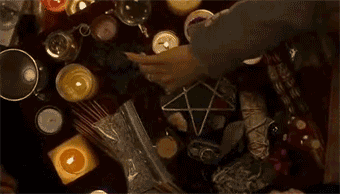
#pagan witch#witch#witches#baby witch#beginner witch#witchcraft#witch aesthetic#witch community#witchblr#witchcore#witchy vibes#grimoire#book of shadows#BOS#witch tips#witch things#pagan#paganism#pagan wicca#hellenic pagan#polytheism#wiccan candles#wicca#spirituality#spiritual awakening#spiritual journey#rituals#what is witchcraft#religion#death witch
36 notes
·
View notes
Text
Beyond the Guidebook: Understanding Tarot Card Symbolism and Interpretation
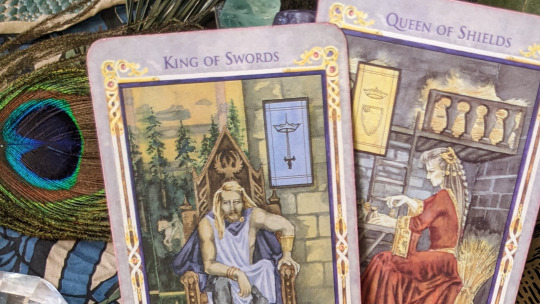
When reading tarot, understanding the symbolism behind cards is crucial. It not only adds depth to your readings but also helps you uncover the deeper meaning of the cards and how they relate to one another. Let's explore the significance of repeating suits, numbers, imagery, orientation patterns, and the placement of Major and Minor Arcana cards in tarot readings.
Tarot Card Suits and Their Themes
When a single suit dominates or numbers a reading, it emphasizes the theme associated with that suit: Cups: Emotions, relationships, and matters of the heart Pentacles/Coins: Material wealth, finances, and practical matters Swords: Thoughts, conflicts, and challenges related to ideas Wands/Rods: Inspiration, creativity, and actions or projects
Tarot Card Numbers and Their Significance
Repeating numbers can amplify the energy and significance of that number's symbolism.
Ace: New beginnings, opportunities, or a fresh start Two: Balance, choices, partnerships, and decisions Three: Creativity, collaboration, and growth Four: Stability, structure, and security Five: Change, challenges, and conflicts Six: Harmony, love, and healing Seven: Spirituality, introspection, and assessment Eight: Power, ambition, and movement forward Nine: Completion, fulfillment, and reflection Ten: Endings, culmination, and a sense of closure
Interpretation of Repeating Symbols in Tarot Cards
When you spot recurring symbols, patterns, or themes in multiple cards, consider the following for interpretation:
Consider the Context: Analyze the positions of the cards with repeated imagery. For example, a repeated symbol that appears in a past position could represent past experiences or influences being carried into the future.
Amplification of Themes: Repeating imagery can amplify the themes associated with that symbol. For example, if you have several cards featuring roses, it may highlight the importance of love and beauty in the situation or the need to approach it with care and affection.
Storytelling and Narrative: Repeating imagery can create a narrative within the reading. It can be seen as a sequence of events or a progression of ideas. Consider how the symbols relate to each other and how they tell a story or convey a message.
Personal Significance: Depending on the reader's intuition and the querent's personal connection to certain symbols, repeating imagery can have personal significance. It may trigger specific emotions or memories, offering a more personalized interpretation.
Card Orientation Patterns
If you choose to read reversals, the significance of card orientation in a tarot reading lies in its ability to add layers of interpretation to the cards.
Mostly upright cards: When the majority of the cards in a reading are upright, it often signifies a sense of internal clarity and ease. It suggests that the primary influences on the situation come from external sources and are generally aligned with the card meanings in their traditional sense.
Mix of upright and reversed cards: A balanced mix of both upright and reversed cards offers a holistic view of the situation. It reflects a dynamic interplay between external and internal factors. This combination highlights how external circumstances interact with your inner world and mindset.
Mostly reversed cards: When most of the cards in a reading are reversed, it typically indicates that the energy related to those cards is encountering obstacles or resistance. It can suggest that certain aspects of the situation are blocked and may require a closer look or adjustment. Reversed cards may also point to hidden facets of the situation.
Major and Minor Arcana Placements in Tarot Readings
The placement of Major and Minor Arcana cards often determines how the card's energy is expressed within the context of the reading.
The Major Arcana cards represent significant life events, archetypal energies, and deep spiritual or psychological themes. The more Major Arcana cards that appear in a reading the most of these forces are at work in the situation.
The Minor Arcana cards focus on day-to-day matters, everyday experiences, and practical aspects of life. Court cards (Page, Knight, Queen, King) often represent individuals or personalities. Their placement can reveal people involved in the situation or specific characteristics or qualities they bring to it.
By understanding these aspects of tarot card interpretation, you can unlock the secrets hidden within the cards and provide more meaningful readings for yourself and others.
#tarot#tarot reading#tarot community#learn tarot#learning tarot#divination#divination witch#witchcraft#tarotblr
41 notes
·
View notes
Text
All state-socialist countries faced externally imposed challenges, while tackling internal strife and attempting to bring about major social change towards equality in often oppressive patriarchal peasant or pastoralist systems. The horrific tragedies and, in some cases (especially the USSR under Stalin), mass killings and grinding political repression are unjustifiable, but the larger context must also be understood to see what needs to be done to avoid those horrors in future. Some state-socialist systems emerged through the establishment of political independence after protracted war but were then trapped in neocolonial dependence and interventionist pressures from former colonial powers, such that building self-sufficiency was stymied, and even more any chances for industrialisation (e.g. Burkina Faso, Congo, Ethiopia, Madagascar). Some extricated themselves from a neocolonial or colonial dictatorship and started substantive independence under terrible social conditions (e.g. Cuba, Mongolia), if not absolutely devastated environmental circumstances (e.g. Kampuchea, Laos, North Korea, Vietnam). There were thus intense pressures to parry from capitalist countries. Rapid industrialisation or the promotion of self-sufficiency was eminently reasonable, given the experience of military invasions from liberal democracies and other capitalist powers, along with military encirclement and constant threats after repelling those invasions. In some cases, foreign powers and internal enemies waged all-out war from independence onwards, such that any effective implementation of socialist policies was altogether precluded (e.g. Angola, Mozambique). Briefly put, socialist states existed under a state of siege from their inception.
Salvatore Engel-Di Mauro, Socialist States and the Environment: Lessons for Eco-Socialist Futures
50 notes
·
View notes
Note
Do you view jaime as a hero or a villain? I see a lot of people on my side of fandom say that he is only the latter
I think this is a silly thing that the fandom fixates on with this brand of grey character. Trying to lock them into just one box is the exact opposite of what George wants to achieve with them, especially a character like Jaime. They fit these labels at different points to different characters. Jaime is a deconstruction, reconstruction, interrogation (whatever other buzzword you need) of so many fantasy tropes: anti-hero, male character archetype of strong powerful brave knight in shining armor, mustache twirling villain, redemption and reformation etc. George loves interrogating what actions and motivations can make someone a “hero” or a “villain”, or a mix of both simultaneously, depending on the situation. He loves to create complex dilemmas with no easy solution. He loves depicting just how grueling and complicated change can be, all the internal and external barriers, and how restricted you can be by circumstances and how often one’s values can be compromised not just as a result of selfish desires or personal flaws but also deeply rooted systemic issues or loyalties or a desire to protect certain loved ones. The people that are obsessed with “he is just a villain because George offhand called him that in an interview along with Sandor and Theon” are being silly imo. He also repeatedly calls him a hero too:

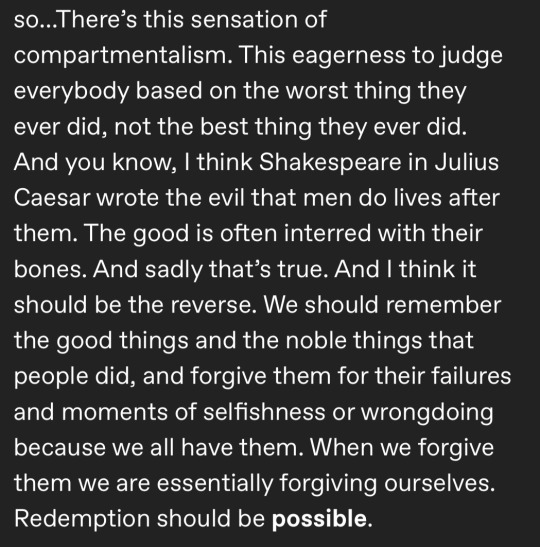

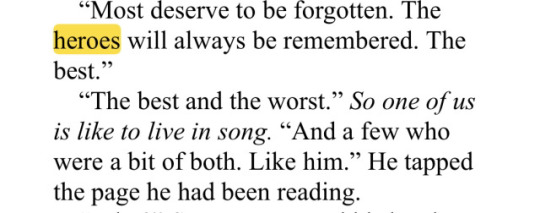
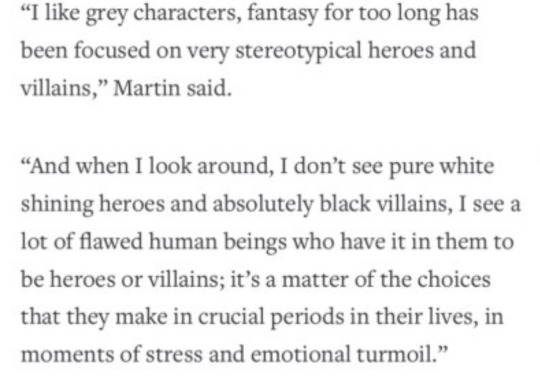
#and i feel the same way about tyrion#george also obviously has characters that deviate from their ‘roles’ less#and are less strictly ‘grey’#be it a hero or a villain#these characters are all on a spectrum of black and white and grey and they all move on it#some more some less#like he obviously has some morally black characters#in povs too#like some characters r more strictly heroes or villains#but with some characters the point is so obviously the exploration and interrogation of both roles#or a transition bw them but even that is not necessarily straightforward#valyrianscrolls#jaime lannister#ask#i especially dislike ‘i know the real jaime and he is a villain and i love him for what he is’ alright man#u r also engaging w him at a surface level#i hate it especially from non lannister fans like y would u know a character better than the ppl who actually focus on their pov#discourse#sort of
55 notes
·
View notes
Note
as the resident cole AND morro guy, uve GOT to have some interesting opinions on wu, so im gonna bite the bullet and ask what u think of my epic guy of all time wu.
I don’t really like or dislike Wu. He’s more so a character to me that is just…there.
He served more as a guide character within the pilots-s2 to sort of introduce us to the lore and world of Ninjago outside of the Ninjas perspective when we weren’t focusing on their world- like Coles father, Jays parents/crush on Nya, Kais ambition towards the green ninja, Nya coming to terms with growing up as a women (saying this as afab), and Zane’s sense of purpose. I’ll get to Lloyd later.
I joke often about Wu forgetting to tell the Ninja about important situations such as the Time Twins, Morro, etc. as most people do, however, I see this more as a fault of the writers than anything else. Characters are bound to be written and expressed differently depending on the writers of the time. This extends to the character of Wu and very noticeably the Ninja throughout the later seasons.
*I’m gonna talk about Cole & Morro a lot but it’ll circle back to Wu I swear.
~ Cole ~
During the beginning of the show we’re introduced to Cole; whom is shown to be somewhat a leader of the group in sense that he’s strong-willed. He’s not afraid of taking down someone who’s threatening the lives of others, but he can easily shed that hard exterior to reveal a caring person. Someone who, later on, is revealed to have had this revelation in childhood as well. He wants to go his own path even if others advise against it.
I believe that Wu did notice this in Cole when Cole was younger. The particular age that Wu started officially training Cole is unfamiliar as the mainline tv show has retconned this a few times while the comics go their own way. Besides that, I don’t believe Wu ONLY wanted to train Cole to become a ninja I believe he wanted to train Cole a certain type of discipline- to pick his battles and to know exactly what he’s fighting for.
I see Cole as someone who would get lost without proper guidance. Someone who has the potential for destruction whether that be internal or external. Someone who fights for what he thinks is right and to help others, but may end up actually hurting those he loves to prove a point.
Cole turning into a ghost is one of the BIGGEST points in his character arc. He sacrificed himself to get the map inside the Temple of Airjitzu thus turning him into a ghost. He accidentally chose his battle incorrectly because he felt obligated morally to help more than he needed too. He knew he was fighting for Ninjago and against Morro, but he didn’t know what he specifically got out of the situation which put him in a type of purgatory. This purgatory is worse than what is normally described, because instead of being cleansed of past sins and mistakes he is substituted to watch himself create more mistakes and “live” through the ones he’s already made without amends. In a perfect world, Cole only realizes he can move forward from his ghostly form if he actively WANTS change.
Wu trying to aid and guide Cole through life so he doesn’t end up like a child he used to teach- only to end up seeing Cole stuck due to circumstances out of his control. Circumstances brought on by someone from the past. Someone who cannot move forward and doesn’t believe in change. Morro.
“I tried to warn you when you were a child
I told you not to get lost in the wild
I sent omens and all kinds of signs
I taught you melodies, poems, and rhymes”
The Yawning Grave - Lord Huron
~ Morro ~
Morro is the same as Cole, at least, in the sense that they’re both strong-willed. Wanting to go his own path and achieving the destiny he thinks he’s entitled too. Wu definitely saw a little bit of Morro in Cole at some point and I believe the ghost arc sealed it.
A lot is unknown about the relationship between Morro & Wu other than knowing that Wu took Morro under his wing to train him to become a ninja. Lore like this isn’t really explored much in Ninjago seasons as they like to focus on present situations instead of past ones. It did seem that Wu really did care for Morro and did try to comfort him after it’s revealed that Morro wasn’t yet worthy of the green ninja title. Although, when Morro started acting out that’s when Wu started to become stern which is where I believe a lot of people have misconceptions about his character.
While we don’t know much about Wus student of the past I think it’s safe to assume this is the moment where Wu recognized that people have to been taught and trained differently. Maybe he taught Morro wrong? Maybe Morro cannot be taught and had to experience hardships himself to actually learn? Next time it can be different- it has too.
The first time I watched Day of the Departed I thought Morro mentioning Coles danger to Wu was to get some type of ulterior motive and the writers were going to explain it at a later date. This..didn’t happen. Typically because of this I joke about Morro helping Cole to get “heaven points” or “helpin another ghost bro out” but if I were to look deeper into it (a territory that the writers had 100% no intention of) I like to picture it as Morro not EXACTLY forgiving Wu but accepting the fact that he’s done wrong and wanting a better life for someone else.
Morro has done bad things, he knows that, and he’s not immune to consequences. Whether or not it was his own fault or Wus doesn’t matter because it’s all in the past. What matters going FORWARD and helping others is the important part.
~ Lloyd ~
Lloyd had a bit of a tricky relationship with Wu. It’s very obvious that Lloyd loves his Uncle, but the lingering thought of his father does get in the way of that love sometimes. Wu was very sweet to Lloyd when they took him in during s1 and even advised the ninja to look past where and who Lloyd initially came from and focus on befriending him and moving forward. From then on mostly it was the ninja and Kai who raised Lloyd.
-
Misako…I’m not a Misako lover. I don’t resonate with her character at all so I don’t think it would be appropriate for me to speak on her relationship with Wu. Not my place to say.
-
Reiterating, while Wu does do the infamous “there’s something I forgot to tell you…” that’s ABSOLUTELY just a writer shoe-in to push more seasons and should not actually reflect Wu as a character.
The way I see it; Wu at the beginning of the series was a character to push guidance and lessons for our characters to learn from so they can “defeat the big bad” of that season. A LOT misdirection of Wu’s character comes from s5. Honestly, I’m an early Ninjago season lover so anything after s7 is not my strong suit so I cannot speak for his character beyond that point.
I’ve been a little distant from Ninjago lately so I wish I could have given a more in depth response, so I tried to reason with what I already knew from the top of my head.
*Side note: I think “The Yawning Grave” by Lord Huron is a really good song to express the relationship between Wu, Morro, and Cole. Highly recommend the listen and looking up peoples thoughts about the meaning of the lyrics online.
*Side note: “Ninjago Mini-Movie #4: An Underworldly Takeover” is a good Cole and Wu focused short where Wu explains the relationship he had with his brother Garmadon after Cole gets curious and asks.

#Ninjago rambling to the extreme…#the fact that they haven’t made Cole and Morro interact again is cruel to me ESP WITH WU!!!#mr Francis is right there .. use him
15 notes
·
View notes
Quote
Life is change; at different points in our life, we will face different challenges, or the same challenges with different resources. Much as the difficulty of climbing a mountain depends on wind, snow or erosion, the difficulty of introspection can change over time based on internal and external events. Individuals might be more prepared to examine the depths of their mind or to pursue things such as enlightenment at various stages in their life, depending on wellbeing, social support, income and responsibilities. During stressful times and limited resources, looking deeply within might prove more challenging than when all is well and support is abundant. Clinging to a set path could also be actively harmful if circumstances change. You wouldn’t continue on a path that had been snowed under by an avalanche; you should shift the type of practice you are doing if it is proving unproductive or harmful.
Real meditation looks quite different from its popular depiction as a breezy, positive way to achieve ‘mental fitness’. So, next time someone tells you to ‘exercise your mind’ or sign up for a meditation retreat, perhaps say you’ll climb that mountain if and when you feel ready. You might explain that it’s not as simple as doing the mental equivalent of a few sit-ups to get in shape. Exploring one’s inner world can be a profound and life-changing experience, but it must be approached with respect for the risks and some idea of the journey ahead. Reaching the summit of the mind via a careful, guided trek could present the challenge of a lifetime. It’s not as simple as taking a few more strolls around the block.
Nicholas Van Dam, Meditation is like mountaineering: approach it with care
34 notes
·
View notes
Text
Psychosophy Subtypes — Volition/Will
1V Dichotomies
IV is a result attitude, so it doesn't keep the desire-forming process in its sphere of attention. In 1V's eyes, desire appears ready-made, where it can be realized or suppressed. And these desires are not changed much by interactions with strangers.
1V is an aggressive attitude: focused on its own desires and their realization, sometimes failing to realize that others have their own aspirations that don't fit into 1V’s own framing.
And 1V is a strong attitude, comfortable influencing others in this aspect, whether by imposing decisions on others or merely confidently following their own path and not easily deviating from.
As usual, there are three subtypes.
1V-2 / Strong 1V
Strong-1V seeks to influence the goals and desires of others.
The other subtypes mostly follow their own path and do not impose it, but strong-1V has trouble remaining aloof in this way.
They are often found in a common cause, guiding others and giving them assignments. If they have no "team" to do this with, they may do this in their household or with their friend group.
This is sort of like 2V, motivating and inspiring the people around them. But 2V is actually focused on the desires of others, they want the other to understand their own aspirations and use them as a guide.
But strong-1V will set the goal by themselves and naturally lead others in that direction, not quite pausing to think about what others' own goals actually are.
Compared to the other subtypes, they really enjoy responsibility, and wish to extend their activities past mastery of the self into mastery of the environment.
1V-3 / Aggressive 1V
Aggressive-1V tends to act like their current road to self-realization is the one true path, and can be disdainful toward those goals lie outside of it.
They tend to attract a group of followers that end up absorbing aggressive-1V's aspirations.
More than other 1V subtypes, aggressive-1V pays attention to the expectations of society and compares themselves to others, which can sometimes give them a 3V flavor.
But you can find the difference in the other dichotomies: aggressive-1V does not need others' help to make decisions or find motivation on the way. For 3V, their confidence and momentum very much depend on whether they are provided this.
Aggressive-1V is the most self-confident and ambitious subtype.
1V-4 / Result 1V
The result-1V subtype shows a visible indifference to goal-setting and self-actualization. They may consider themselves lazy and unable to get what they want.
External motivation doesn't really matter to them at all if they are without internal incentive.
The way result-1V usually works that they want to achieve the whole thing at once, rather than spending much time and effort to achieve the goal.
This can give them an air of uncertainty, like they are not really a leader, which can make them look like 4V, especially 4V-result.
To distinguish them, notice the following. First, you can't really impose your will on 1V-result. especially on anything that really matters (where 4V can usually be persuaded, especially if they know that you will leave them alone if they do what you want).
Secondly, 1V-result does not blame anyone but themselves for their failures: in their worldview, everyone is in charge of their own life. If you complain about fate, they will not be sympathetic.
Whereas 4V will often refer to annoying circumstances or others' mistakes, preventing achievement.
Still, 1V-result is the least purposeful subtype.
2V Dichotomies
2V is a process attitude: it will not bypass the goal-setting process. It's not enough to have readymade instructions or outlined plans: 2V finds it important to coordinate with both their own and others' desires.
2V is a passive attitude: they pay at least as much attention to others' desires and achievements as their own. Sometimes it may seem to others and to 2V themselves that they do not have their own aspirations at all. It is easier for 2V to find what they want when they discuss plans with others.
2V is a strong attitude: they do not sacrifice their own desires to someone more in command.
Instead, they will try to exert influence themselves, to either actively support the proposed course of action or to actively work against it.
Which of these properties comes out most determines the subtype
2V-1 / Strong 2V
Strong-2V is purposeful. They wish not only to discuss the decision, but to persuade the other person to act.
Such a 2V can easily step into the role of leader, to cut through the inertia. Whether through polite persuasion or outright provocation, they will get others to participate.
Sometimes it seems like they are not actually interested in noting what others want, which makes them look 1V-ish. But 1V wants to actuate its own desires immediately (which naturally leads to highs and lows of acivity). For strong-2V, getting others to act is almost a form of entertainment, which makes them more persistent (it does not drain them as much to involve others).
You will also hear strong-2V say things like: "I'm not doing this for my own good, *you* want this, and you're just sitting here!" This makes strong-2V seem intrusive but this sort of pressure is very useful, it's what any team can use if it wants to build momentum
This is the most insistent 2V subtype.
2V-3 / Process 2V
Process-2 V is quite democratic, a natural opponent of any restrictions and constraints.
In their opinion, nearly any proposal can and should be considered.
Process-2V subtype spends a lot of time and attention weighing each decision, figuring out whether they or someone else really wants to carry out a plan.
If a decision has already been made, they are always willing to go back and reconsider it. So maybe you agreed with them yesterday about who will do the work in joint project, and today they propose somehing else, ask again if you are satisfied with the direction, reflect on whether they really want to do it.
This can make them look like 3V. But 3V really needs discussion of plans, to gather enough motivation and confidence in their desires. Whereas process-2V doesn't need to be "recharged" in this way. it just wants to weigh the pros and cons
Process-2V is the most agreeable 2V type, and the hardest to discern the motives of.
2V-4 / Passive 2V
Passive-2V is quite attentive to others' intentions. Before making a decision, they will think about what others want.
They will listen to another's plans for a long time and carefully, and usually genuinely support them (outright refusal is hard for passive-2V).
If passive-2V is firmly opposed to a goal, they will usually try to remove themselves from the situation to avoid hurting anyone.
This looks like 4V, but 4V becomes tired quickly of "messing up" plans (the process of changing them). they are more inclined to help at the later implementation stage than the earlier "what and why" stage. 4V also will yield to pressure much of the time.
Passive-2V is not like this: they listen to others in order to actively be involved with the creation of the goal, and if you look closely they are still more guide than follower.
They do always leave their partner a choice: but passive-2V will be generating the options for that choice themselves. They are like an advisor, prompting accurately and caretully while leaving the right to make a decision).
3V Dichotomies
3V is a process attitude: it keeps the process of forming and realizing goals in its sphere of attention. 3V thinks and talks about what they want, how they're going to do it, and whether it's worth it or not. They are responsive to others' input in this area, and appreciate the right sort of feedback.
3V is an aggressive attitude: it is oriented toward achieving its own ambitions, sometimes not noticing that others have desires too.
3V is a weak attitude: it is subject to influence from outside, even if it doesn't want to be. 3V tends to attach importance to public oDinion. the may do a lot to get a positive response or do a lot to avoid being noticed to avoid a negative one).
One of these properties usually comes out more clearly than the other two, giving us subtypes.
3V-1 / Aggressive 3V
Aggressive-3V subtype is the most ambitious. They want to feel good about their own worth, and to prove this to others.
Often aggressive-3V sets big goals and does not shy away from telling others about them: they want attention focused on them and on their activities. They tend to draw attention and strong opinions from others, anywhere they go.
So from the outside, they look self-confident and independently successful, 1V-ish. What's the difference?
Aggressive-3V is more likely to take the opinions of others seriously, to fight back, and to declare that the need for this is an inevitable part of life.
On the other hand, 1V does not believe that it is possible for external circumstances to restrict their fundamental internal freedom of action, so they do what they see fit, not aiming to prove anything. This mindset is foreign to aggressive-3V.
3V-2 / Process 3V
Process-3V is more harmonious than the other 3Vs, being close in spirit to 2V.
They are interested in the common cause, they appreciate support and know how to provide it, they are not too proud to lake criticism.
They love to discuss their desires, actions, and plans for the future, and view achieving goals as a creative and dynamic process. If they are on a team, process-3 V can achieve a lot.
Unlike 2V, process-3V is primarily concerned with their own aspirations, viewing this interaction with others as a way to make progress there.
Also process-3V suffers from self-doubt and lack of motivation: to stay on the path, they need some benevolent external influence (where a 2V can provide this on their own).
3V-4 / Weak 3V
Weak-3V is very afraid of others' judgments, their harsh words and scolding looks. The desire to avoid this usually exceeds the desire to get what they want.
Weak-3V is usually secretive, keeping to themselves, and secretly resentful of others who are not like this.
They have trouble accepting help, both because they generally distrust people, and because they don't feel they're worthy of receiving it.
Weak-3V often considers themselves insignificant, miserable, incapable of anything, and these thoughts can overwhelm them, suppressing their ability to act.
Externally, they usually look like they are agreeable and go with the flow (like a 4V), but 4V has a tolerant attitude toward themselves and an accepting attitude toward others.
Weak-3V is often at their best in a hierarchical structure, where there are more powerful people to obey, and less powerful people who provide a sanctioned ground for self-assertion.
Even if effective there, weak-3V feels that they have not realized their true ambitions out in the "big world", and may take this out on anyone depending on them.
This is the most closed-off 3V subtype.
4V Dichotomies
4V is a result attitude: it usually doesn't pay much attention to how they and others form then intentions. instead seeing desires as a sort of obiective reality: what is to be done? Either you proceed with your agenda, or you abandon it for that of another.
4V is a passive attitude: it supports the aspirations of others more than fixating on their own (let alone involving others in their own agenda). If you can "infect" a 4V with your own goals organically, they can perform miracles of perseverance helping you.
4V is a weak attitude, it is easily influenced, and thus a 4V if not careful may suffer from adopting others' goals that are alien to their own nature. Additionally they will not usually impose their own decisions, believing this a personal and private matter.
This leads to three corresponding subtypes.
4V-1 / Result 4V
If result-4V's desires conflict with those of another, this is a difficult situation: they will not usually enter into dialogue or seek compromise.
Usually result-4V will just follow their own desires and do whatever enters their head instead.
This is a 1V-ish tendency. But unlike 1V, result-4V naturally avoids responsibility and struggles to keep promises (since it is difficult for them to do anything they do not want to do).
It is also notable that result-4V can be influenced by others, which can result in a rebellious tone: "leave me alone, I don't want to do it!" 1V in the same situation would remain calm, basically ignore the expectation, and continue on with their own agenda
Result-4V is the least collaborative of the subtypes.
4V-2 / Passive 4V
Passive-4V is distinguished by an interest in others' desires and goals, and an involvement in their implementation.
The active nature of this support, as well as a tendency toward compromise, gives them a 2V flavor.
There are two main differences. First, passive-4V will tend to compromise their own interests and agenda, which is not characteristic of 2V.
Second, they feel out of place in the process of setting goals and defining what is wanted in the first place, preferring to specialize in the later step of more straightforward achievement.
Constant searching and doubting on another's part (*cough* 3V) depletes passive-4V, since it often feels like a senseless waste of effort. (2V finds the same situation an excellent opportunity to display their creative potential).
Passive-4V is the most hardworking subtype, the most inclined to joining others in projects.
4V-3 / Weak 4V
Weak-4V is quite susceptible to others' influence in the area of desires and goals. They usually go with the flow, dreading to make decisions on their own, folding to others.
Weak-4V is usually too insecure to want to achieve anything that substantial. They lack ambition in work and relationships alike.
They are docile and tend to rely on their partner: not because they trust their partner, but because thinking about their own development feels odd and they seek out something to replace that feeling with.
Their low self-esteem and tendency toward self-doubt can make them look 3V-ish. But unlike 3V, weak-4V isn't so resentment-prone: they are not angry at those who are more successful, and do not suffer for not having realized ambitions as large as they'd like.
Weak-4V's lack of initiative and inclination to obedience is not a sneaky mask, it is a genuine internal state. This is the most sluggish of the 4Vs.
11 notes
·
View notes
Text
Lesson of the year



Hello and welcome to my 'end of the year pac' 🎆. What I will be focusing on is providing some insight into an important lesson you've learnt this year, how it did impact you, and how it will provide itself useful for the coming year.
If you feel like this pac holds some information for you, pick the image you're most drawn to and take what resonates and/or applies to your life situation ☁️💜.
I wish all piles happy holidays , a happy new year and lots of success in 2023!

Hello pile one and welcome to your reading 💜☁️
Pile 1
The lesson you have learnt this year is that you aren't as weak as you thought you are. You used to have this idea that you need to wait for the " best" moment possible to take action, because the circumstances around you aren't favourable, but this only meant that you'll wait forever. Your mind was your worst enemy this year , and made you shy away from taking action, making decisions, it put you in a position of passivity and uncertainty, which further aggravated the way you used to perceive yourself.
You've managed to see how this mindset was affecting you, and managed to at least change it, in case you haven't yet made any big shifts in your life. You managed to see that facing your fears and starting to look into your future trough renewd lenses, makes your future to look less gloomy and dark as you used to see it. Sometimes the change has to start with you.
Learning this, has opened up the opportunity of feeling like you can truly change your circumstances, and filled you with hope for a new beginning. You might be at the very beginning, but this should not stop you from being optimistic and trying your best. In case you were self conscious about your talents, passions or anything creative, in the coming year you'll feel less concerned with what others say about you, because you've learnt to appreciate yourself instead of letting yourself feel victimised and not to seek external validation. This attitude will prove itself useful in creating long lasting results in regards to a new path you're going to follow. ( it can be career, studies, the way you see life,or even life in a general way)
Pile 2
Hello pile two and welcome to your reading 💜☁️
The lesson you learnt this year is that you can provide more than enough for yourself, rely upon yourself, and not sacrifice your emotional well-being, your confidence to please others, or that you don't need to stay around people with limiting beliefs who take advantage of you, just because they provide you with some sort of "comfort " like material one or emotional one. You've got a lot if court cards plus the devil, which made me think that you were stuck with someone, a male figure ( parent, family member or lover) because you neded a place to live or didn't have enough finances to move out, or you were somewhat emotionally dependent to them.
You might have been burdened by this person or group of people. Maybe you had to do something for them in order for you to still be able to be " seen " by them. It's possible that some of you have worked really hard behind close doors in order to achieve your freedom. You seem to have always been strong and dealt with everything like a pro internally/ emotionally, but the outside circumstances weren't that favourable.
This is going to help you further, in regards to finding either a relationship, or a group of people/ friends, you can relate to. People who accept you the way you are, without having to "buy" their love and respect. If not, you might simply be in a position where you will be free and able to enjoy yourself, do what you want , without imposed limits created someone else.
Pile 3
Hello pile three and welcome to your reading 💜☁️
The lesson you've learnt this year is letting go of what's no longer useful and helpful to you. You may have dealt with lack mentality issue, where you were unable to envision yourself in a better place. Based on the abundance of pentacle cards, this is related to money. Some of you were maybe setting for less than they deserved at work, and even dealt with conflicts with coworkers. Maybe you've have heard gossips about you, coworkers were always pointing out your flaws , or starting rumours about you. You've learnt that the money you receive isn't worth such a treatment and working in such environment, you decided it's time for something better, you deserve better.
It's also highly possible that you might have settled for this job out of not having a specific qualification, which required further development of skill + a paid course. You maybe thought that you should settle for some random job just for the sake of having a job not because you loved what you did.
I feel like you were definitely wasting your talent and skills, but the way you were treated made you doubt you could perform well in a different place or on a different job. The fact that you realised how you were wasting your potential, will open better opportunities for you, and you'll be able to recognise when you're taken for less than you are worth of. It's also highly possible that you might decide to take a course in order to better develop a certain skill, so you can find a better job that's not only better paid, but where people are more focused on work rather than personal conflicts and creating drama at the workplace.
#tarot reading#pac reading#tarot#free tarot#pick a card#pick a card reading#pick a photo#pick a pile#tarot pac
25 notes
·
View notes
Note
any tips on how to deal with temperamental parents? 🫠 btw you reblog the cutest art there is, it's really soothing 💖
Thank you kindly for your wonderful words, my Sweet ! I do hope you're doing well. Though, from your question, I can see that you may be struggling with your parents?
I'm not entirely qualified to give advice on matters as personal as these, so I do ask you take what I say with a grain of salt since it may or may not apply to your current circumstances, but I do have some tips to help you in your personal wellbeing, if that's of any help <3 !
I can't speak on your living situation, but if you live with your parents, just remember that you won't have to live with them forever. One way or another, either by working hard, a stroke of luck, or a sudden shift in internal or external circumstances, there will come a day where you won't need to deal with your parents' changes in attitudes. Until then, I'd advise on focussing on doing well in an academic/career path; I think finding solace in education/professional achievements can be very cathartic and fulfilling, and they can provide you with means of getting out the house and experiencing what life has to offer.
If neither of these are an option to you, perhaps a hobby? Colouring, drawing, writing, reading, crocheting, knitting, and other activities of the like typically make little-to-no noise, so if you're afraid of drawing your parents' attention, these are all relatively good options, in my opinion. If you'd like to try learning an instrument, singing, or something that might create more noise, you could try learning them outside the house? You could join a club or see if your workplace/place of education has any spaces open in clubs, societies or even just spare equipment or rooms lying around that you could join or use.
Furthermore, depending on how your parents' mood changes make you feel - anxious, angry, upset - breathing exercises are a good way of centring oneself and blocking out the outside world. I understand this isn't going to necessarily solve the root issue of why your parents act the way they do, but it can help calm your mind and reduce their emotional and mental impact on you, if only for a short while. Meditation is also a good way to soothe yourself, though it does take practice. However, once you become good at it, you can use it in a multitude of situations - kind of like a mental multitool :-).
I hope these helped, my Lovely, and if you would like to ask anything else, don't hesitate to send in an ask ! Best wishes, my Sweet ^^
3 notes
·
View notes
Text
The Importance of Self-Insight.
What I learned from Carl Rogers.
There seems to exist a constant battle between the external and the internal. The external being things like family environment, health, intellectual development, economic circumstances, cultural influences, social interactions, educational development and so on. There is no doubt that these experiences shape our personality and our perceptions of the world. The internal is a bit more difficult to explain. It’s the part of you that encompasses self-understanding, self-insight, and defined as an acceptance of self and reality, and a sense of responsibility for the self. Self and tendency toward actualization is monumental in your personal achievements, how you perceive them, and in Self-Actualization overall.
I believe we all have an actualization tendency. This tendency for basic human motivation to actualize, maintain, and enhance self. This process of course involves struggle, pain, and strength. This internal motivation includes physiological and psychological needs but goes further to soothe a person’s self. During the governing process throughout one’s lifespan we evaluate the experiences we encounter and unconsciously or consciously determine that they are positive or negative. This process of judging experiences in terms of hindering or fostering actualization and growth quite frankly changes our reality. Perception of experience influences behavior (which can snowball into self-fulfilling prophecy but I won’t spend too much time on that this post). Our experiential world can challenge us, but these experiences will broaden our world and sharpen who we are. We become a product of not only our nurtured environment but also how we feel and think. “What we think, we become.” “I think, therefore I am.” Of course it’s our reality. An individual’s experience of the world changes their reality. A Reliable Reality depends on one’s perception of experience and of course perceptions can change with time and circumstance. Experiences become the basis for judgments and behaviors- shaping our personality. And as the actualization tendency leads us to grow and develop, naturally our experiential world will broaden. Carl Rogers suggests that higher levels of development sharpen our world and ultimately lead to the total development of the self.
I want to also acknowledge that unconditional positive regard leads to positive self-regard. And conditional regard can lead to beliefs that center around conditions of worth. Self-worth and self-love might be a complicated relationship for those who didn’t receive unconditional positive regard. Healthy people can perceive themselves, others and events in their world as they are. They are open to new experiences because nothing threatens their self-concept. They have no need to deny or distort their perceptions because they received unconditional positive regard as children and did not have to internalize any conditions of worth.
A peek into my self-insight:
Life with mental illness, whether you have awareness of it or not is quite frankly, challenging. Battling with yourself and trying to practice forgiveness and relieve shame is tiring. When I look introspectively I often find a lot of negative feelings. Having Bipolar disorder and being diagnosed in my early 20s has led me to retrospectively think about actions I did, words I said, that I’m now ashamed of. It’s probably the reason why I have been in a depression the past few years and it’s part of the reason why I don’t want to live. If we are talking about self worth I don’t think I have that much, if any at all. I don’t feel that I am deserving of the opportunity of life and I don’t like living a boring life- but I don’t have the perseverance or energy to make a life worth living. Self Actualization has taught me that if certain steps aren’t resolved, it’s harder to move up and reach actualization. I am working on healing parts of me so that maybe I can move up that pyramid. So when I practice self-insight I know that I am doing it wrong. Actively practicing awareness of those negative self thoughts should help reprogram self perception. I wish I had self awareness earlier. I wish I could do self love. Like really do it. I practice sometimes, maybe not enough and even in this post I harp on my self with my words that I choose. I dislike myself so much that when I access my unconscious, I flood the page with negative comments. I need to do better. I want to do better. For the sake of my reality I will find strength. I will continue to heal, to go through my struggle and my pain. I have self worth. I am worthy. I deserve happiness. And though no one might ever read this, if you are... you do too.
Journal Entry 04/16/2023
#self healing#psychology#carl rogers#self actualization#self introspection#healing#worthy#self worth
9 notes
·
View notes
Text
The high expectations during teenage years
Isabel Metzger Estevão
One of the problems teenagers have to deal with is the high expectations people have on them. During the transition from kid to adult, people face a lot of internal and external conflicts. In this period, there are certainly a lot of expectations put on them, by themselves or others.
Firstly, when a child is transitioning from childhood to adulthood, the parents tend to idealize their life, putting their own dreams and hopes on the child’s future. Due to this, kids in this phase feel a big amount of pressure on them to live up to their parents expectations and plans. Although the dreams adults have of their children have changed during history, they are still there.
Secondly, teenagers have their own aspirations as well as dreams for their future, that also changed along history. For example in the past these goals would be more focused on building a family, but nowadays it is more centered on the development of their careers. Rarely do these goals are equal to the ones their parents have for them, according to the book “Juventude e Sociedade” by Cynthia Andersen Sarti. Consequently, there are conflicts between the two generations. The older ones try to impose their dreams on the younger ones, who resist and try to choose a different path than the one their family wants.
Thirdly, not only do their parents or themselves have high expectations of them, but also other teenagers. This time of their lives they have a lot of new experiences. In addition, some people might feel pressured by friends to do certain things. This can be very bad, since not everyone is prepared to deal with specific situations at the same age. Owing to it, some teenagers can end up in difficult circumstances for doing something because they were pressured to.
To summarize, all of these kinds of expectations may be prejudicial to teenagers. They are in the most important years of their development to adulthood, already facing a lot of conflicts as a result of the transition from being a kid to becoming an adult. This time of their lives is key to their futures, therefore it is a very stressful and confusing moment. In addition the expectations of others can make this period even harder, since they will feel even more pressured. On the other hand, it can help them sort their future in a better way, by balancing their and others expectations.
In conclusion, this time of life has a lot of changes, the possibilities are still open for the future, which causes really high expectations, something that can be a good or a bad thing depending on the person. Nonetheless what is certain is that it is a very stressful moment and under no circumstances do teenagers go through it without feeling any pressure.
2 notes
·
View notes
Text
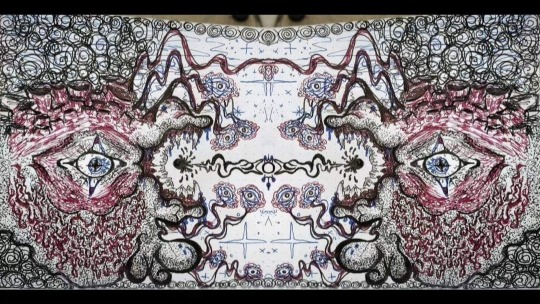
Now, It wouldn't be like me if I didn't post a poem,
That is I, Quinci 🧚♂️
Maybe there are other poets here. Depends on the topic, the trigger area, and at what point of my life and day I wrote it. More recently we would find there is more variety, it is a group effort, after all, and it is all in the subtleties. People do change all day everyday, it's only when you notice in front of you that you might pick up on something strange, but most of the time, it just makes me a little weird. I think this might actually have a deeper cause.
Come back later for a chart or something, and a further analysis on: Littles, Gate keepers, Persecutors, Fictives, Spiritual Sources, and more! Maybe I'll purely use emoji code. It's like. Different thoughts come from a different specific source in my head. I would need to use MLA parentheticals lmao... I say that... But it does strike a youthful joy. Bet I would get some cool memories from it...
I wrote out this whole post before it occurred to me that while I might post and write poetry, I am not necessarily the artist. That title belongs to a handful of potential others. It's all retrospective circumstances to me. I could tell you this is likely a Ransom 🏇and Rebel 🌛 piece. I guess I sort of want the internet abyss to get to know us.
Enough digressing. I present to you
PRETTY PICTURES
Go ahead. / Dissect these images
Instead of asking me questions
I represent
The duality of thinking/ And existing
in content and art
The internal, the external /The light, the dark
There is no good nor bad
Constantly striving /For what you don't have
And can never get to
Before your own source / Consumes you.
Ever present
Ever watching
Ever wanting /Never failing.
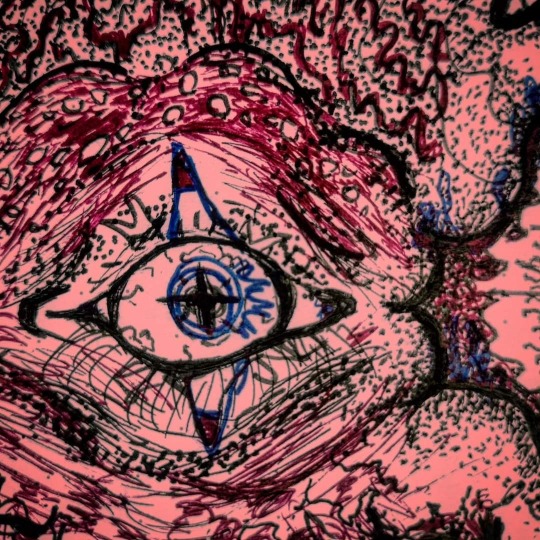
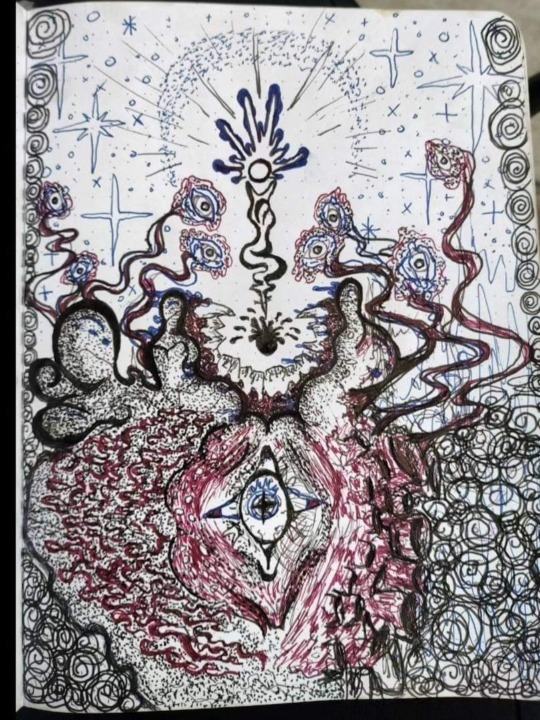

#collage#cryptic#art#mental health#acid art#psychedlicart#psychology#did osdd#osdd 1b#osdd system#diary entry#scary art#void#screaming into the void#duality#monster#smelly man#micron#stippling#queer#queer artwork#queer artist#poemsbyme#slam poetry#short poem#poets on tumblr#poetry
2 notes
·
View notes